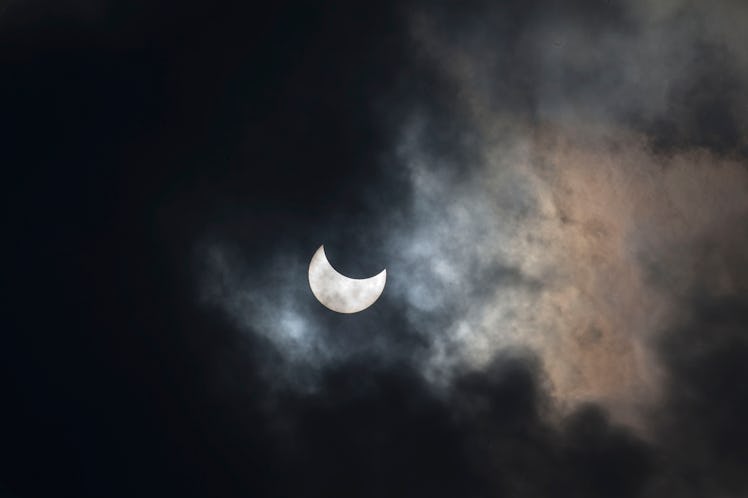
A Partial Solar Eclipse Is Coming & Here's How It Could Affect Your Body
It was almost a year ago that the solar eclipse of 2017 came, went, and made everyone lose their sh*t in a matter of minutes. And on Thursday, July 12, 2018, the solar system will take us for yet another ride with a slightly less exciting, but still pretty rad, partial solar eclipse. Basically the sun, moon, and Earth will rendezvous for a moment, and the event itself is pretty brief. Still, you might be wondering how the solar interaction will affect things like your sleep patterns, or more personal details, like if the partial solar eclipse affects your period. While there are definitely some interesting coincidences out there making a case for how the human body could be linked to the moon’s phases, chances are, if you’re cycle’s off this month, the stars and planets probably aren’t involved.
If you’re totally lost and have no idea what a partial solar eclipse even is, allow me to explain: Per TimeandDate.com’s definition, a partial solar eclipse takes place when the moon, the sun, and the Earth align imperfectly, causing the moon to cast “only the outer part of its shadow, the penumbra, on Earth.” It’s so slight, in fact, that even if you were watching the night sky as the partial solar eclipse was happening, you wouldn’t pick up on it. Still, even if you can’t watch a partial solar eclipse, many astrologers believe you can definitely feel the effects of one. As for your OBGYN, however, they’re more likely to say the partial solar eclipse won’t have anything to do with how your cycle goes this month.
It's true that a woman's menstrual cycle has four phases like the moon, but according to Lunapads CEO Suzanne Siemens, that's about all they have in common.
Before I started writing about periods on the reg, I thought a menstrual cycle started when you bled, and ended when you stopped. This, my friends, is not the case. There are four phases of your menstrual cycle: menstruation (when you bleed), follicular (when your ovaries mature), ovulation (when an egg is released), and the luteal phase (the beginning of PMS). In total, a cycle can last anywhere from 21 to 35 days, depending on your individual body.
Now, the moon also operates by phases, the primary being: new (when the sun and moon align and all you see is a shadowy sky), waxing crescent (when only a thin sliver of the moon is visible), first quarter (when the moon has gone one-fourth of the way around the Earth, and half the moon is visible), and full (when the sun and moon align at opposite sides of the Earth). The moon goes through each of its primary and intermediate phases in a matter of about 29 days.
So let’s recap: Both the moon and your period revolve around four primary phases, and both can last 29 days in total. As far as Siemens is concerned, this is where the similarities come to an abrupt stop: “The science is pretty clear that there isn’t [a link between menstruation and moon phases], and it makes a lot of sense,” she tells Elite Daily. “Everyone who menstruates has a different experience. Factors including stress, illness, diet, and medication can impact your cycle far more than the phases of the moon.”
But even though Siemens and other health experts in the space will tell you the partial solar eclipse won't affect your period, astrologists still say it can affect you in other ways.
According to CafeAstrology, not only can the partial solar eclipse affect you mentally, you may be feeling it for up to six months after the fact. Because the partial solar eclipse is taking place in the sign of Cancer, the outlet says things like "domestic issues, family, personal popularity, the public, women’s interests, safety, security, food, support, our past/roots/heritage, and emotional issues" are going to come into focus. This is meant to challenge you, but also to make room for exciting new beginnings.
Seeing as how the partial solar eclipse takes place on the first, or "new" moon of July, it makes sense that this would be a time for you to welcome new opportunities in your life. And, as is the case with your menstrual cycle, what's "new" for you isn't necessarily what's going to be the "new" that presents itself to someone else, so you and your best friend, for instance, might be influenced by the partial solar eclipse in totally different ways.
So maybe the partial solar eclipse won't affect your period after all, but if you do feel like something's off with your cycle, it's always in your best interest to talk to your doctor. Still, if you want to blame the moon for intense cramping or chocolate cravings the size of Texas, I definitely won't judge you for it. After all, everything's subjective, right?